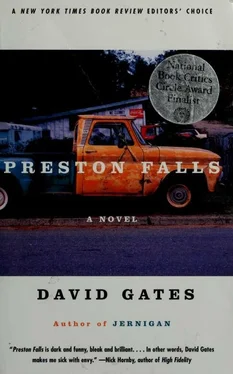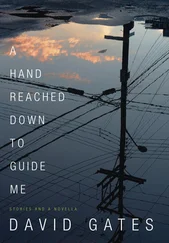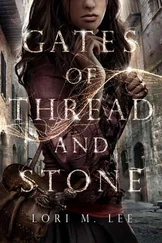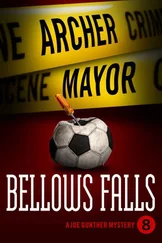"It's less than four years," says Roger.
Jean closes her eyes: two hundred weeks, and one year is — he's right. "You'd still be thirteen," she says.
Roger says nothing.
"Okay, here's what's going to happen," she says, totally winging it. What is going to happen? She fixes on the scattered Pogs. "I'm going to have to pay for repainting Aunt Carol's truck, and that means I'll have to do without some things. So you're going to have to give up something too. We're going to say your Pogs are worth a dollar apiece, okay? So you're going to give up two hundred of them."
"But I only have —"
"You're old enough to know that the things you do have consequences," she says.
"But if I'm good I get them back, right?"
"I need to think about that." The lesson, at its purest, should be that gone is gone. Or is this just stupidly punitive? The whole thing is so artificial: why shouldn't the loss be artificial as well? "I'm not going to answer that now," she says. "I want you to count out two hundred of these."
Roger rolls over onto his stomach in defeat. "Can I pick which onesy
PRESTON FALLS
"As long as it's two hundred," she says, getting up and digging in her thumbs to massage her lower back. "And I expect them to be in the bottom drawer of my dresser before you come downstairs."
Down in the living room, she finds Mel sitting cross-legged on the sofa with the road atlas on her lap, open to New HampshireA^ermont. Jean decides to think she's just looking at where she was yesterday and not cooking up her next escapade.
"Mom, can I go over to Erin's?"
"We need to talk about some things first."
"Like what?"
"Like whether or not you're grounded."
Mel's mouth comes open, theatrically. "Why-y}''
Jean drops her own jaw open, in mean-spirited imitation. "Why? Because you skipped school, you stole my credit card, you could have gotten yourself into — by the way, may I have my card back?"
Mel bends forward to reach in the hip pocket of her too-snug Levi's; when she straightens up, Jean sees she's begun to cry. She hands her mother the MasterCard.
"I'm not mad at you, sweetheart. I just want to make really sure that you would never, ever, do anything like this again. No matter how upset you are. Right?"
Mel looks down, shoulders shaking.
"Promise me," says Jean.
Mel gets out an Okay. Jean listens to the sobbing to assess its sincerity, as if homing in on an instrument somewhere in an orchestra to hear if it's an oboe or an English horn.
When she subsides, Jean says, "I'm not going to ground you." Like Mel's usually allowed this wild social life. "The only thing, as far as going over to Erin's, I think today I'd just rather have you home. I haven't really seen you or Roger for—"
"You saw me all >'6'j^terday. Mother." Mel's back to normal. Too quickly: she's devalued her weeping.
"You know what I mean. I'd like us to be together."
"Oh great."
"If Erin would like to come over here later—"
"She doesn't want to," says Mel. "Our house is cruddy, and there's nothing to do."
"Is that what she said?"
"No, but that's what she thinks."
3 0 S
"So what did she say, exactly?"
"That her and her mom had to go somewhere."
"That doesn't sound quite the same to me as saying she didn't want to come here," Jean says. "Are you getting hungry? We haven't had any lunch."
"Sort of."
"So why don't I go put the clothes in the dryer and then fix us some lunch. And maybe try to get Roger involved in a game of Monopoly or something."
"I don't feel like Monopoly," says Mel. "I don't know, maybe."
It turns out to be the first right move of the day. Of the week. Roger lets himself be lured down, and as they play, they eat peanut-butter-and-bacon sandwiches — peanut butter and banana for Mel — and listen to the Beatles. It's so odd that a terrifying song like "I Am the Walrus" has become kid-friendly, Roger buys Park Place and Boardwalk but passes up chances to get other stuff so he can save for a hotel. Two Beatles CDs go by before Mel begins fidgeting and Roger starts getting up to do things between turns. When Jean suspends the game — to be continued tonight — they protest, but they clearly need a break. And she needs to put in the storm windows, to stop these cold drafts.
The downstairs windows are easy: push the screens up, pull the glass down. She takes the screens out of the combination doors, carries them out to the garage, brings the glass inserts back and sticks them in. The upstairs windows, though, take the old-fashioned wooden storm sash. Does she really dare do this? She gets the aluminum extension ladder from the garage, leans it against the house and climbs up to scope out the situation. Looks like all you have to do is hang the storm sash from those hooks above the windows, push them into place and turn the little things at the sides to secure them. She goes back out to the garage for the first one. Thank God they're not huge — you can bring them up the ladder one-handed while holding on with the other hand. And there's only six of them.
When she comes back inside, her face feeling aglow from being out in the cold, fresh air, she calls upstairs to ask who's ready to go on with the game. Roger yes; Mel no, then yes. Soon Jean's having to mortgage her cheapo properties. She nicknames Roger "Roger the Ruthless," and he goes Heh-heh-heh. For all the world like a nine-year-old. Mel's bored but indulgent.
When Jean thinks to look, it's dark outside. She remembers they
PRESTON FALLS
need milk and God knows what else, so she asks Mel to play for her and goes into the kitchen to make a list. Actually, Carol left them pretty well stocked. Okay, milk, orange juice, maybe Rice Krispies, since even Mel won't eat shredded wheat. They've got bread for toast, but English muffins would be a nice change. It might be good just to have something light for supper. Soup and toasted English muffins. Cut up an apple. She puts on her jacket and asks if anybody wants to ride along to 7-Eleven; no takers. Roger says she's just won second prize in a beauty contest, collect ten dollars; this cracks him up.
She uses the pay phone outside the 7-Eleven to give Champ another try, feeling like a straying wife inventing an errand so she can call her lover. But she thought she should tell him they found Willis's truck, at least that's her excuse, and the kids don't need to know about every hopeless phone call. Champ hasn't heard a word. Not a peep. Would've called if he had — ^well, hell, she knows that. Weird about the truck. But shit, it's all weird. What can he say?
Heading home with their little bag of groceries, Jean turns the corner and pulls over to look down the block at their house. Lights cheerily on, orange pumpkin bag bulging with dead leaves. It could be any family's house. For a second she pretends that she has no connection to any of this. The thought creeps her out. She could just drive by that house and keep going.
F Q U R
Champ hangs up the phone and says, "You are a sick, sick pup."
"Yeah, okay," Willis says. "No argument." He's sitting in the plump, onion-smelling Salvation Army easy chair in Champ's kitchen, sunk with his ass lower than his knees because the springs are shot to shit; his index finger's clamped in a book called Oswald Talked that Champ says blows Gerald Posner out of the water.
"And I'm a sick pup," says Champ, "for going along with this shit,"
"Okay. Point taken. But what did she say exactly?"
"Well, I can't like paraphrase it word for word" Champ says. "They towed your truck off of Houston Street — she thought I better have that information. Look, you have got to straighten this shit out. You know what I'm saying?"
"I wiU. I'm going to."
"Yeah, like when? Because I'm not doin' this shit anymore, okay? The last fuckin' time I'm going to like lie to your wife.''
Читать дальше










